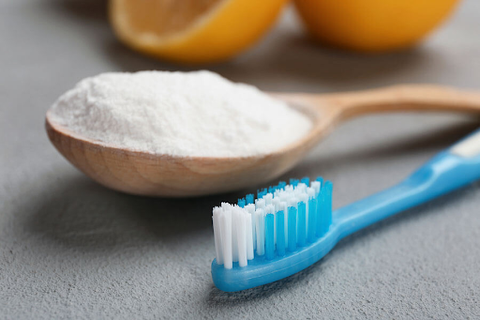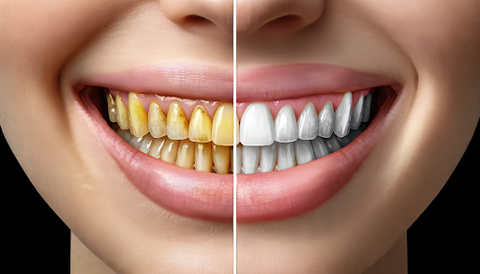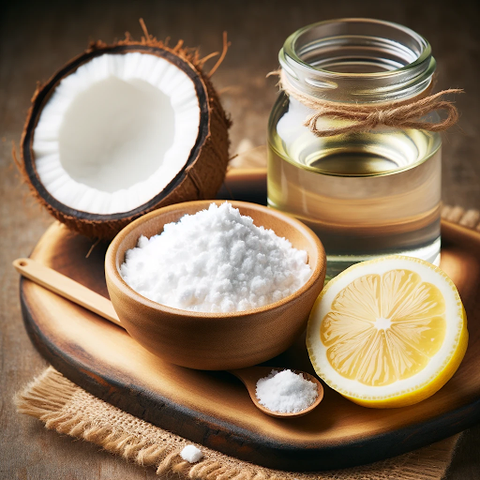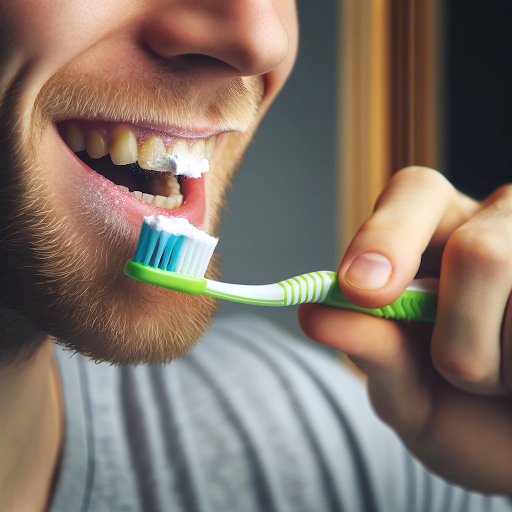Many people strive for a bright, white smile; there are many natural and cost-effective ways to enhance their dental health, and one common solution is baking soda for teeth. It has gained popularity due to its affordability and natural properties. Baking soda is known for its versatility in cleaning and deodorising the teeth. But does baking soda whiten teeth? And more importantly, is it safe for regular use? This article explores whether baking soda teeth whitening is effective, its potential risks, and the best ways to use it.
Does it work?
Baking soda for teeth is often recommended as a natural remedy for removing surface stains. A common question that arises is, does baking soda whiten teeth? The answer lies in its mildly abrasive nature, which helps remove surface teeth stains caused by coffee, tea, smoking, and certain foods. Due to its mild abrasiveness, it helps scrub off plaque and superficial discolouration. Additionally, baking soda is alkaline, meaning it can help neutralise acids in the mouth that contribute to enamel erosion and tooth decay.
While it does not contain bleaching agents like professional whitening products, it is effective in polishing the teeth and giving them a cleaner appearance. Over time, consistent use of baking soda for teeth whitening may contribute to making your teeth look naturally brighter.
Is Baking Soda Bad for Teeth?
A question always comes to our mind: How to whiten teeth with baking soda? While many people use baking soda for teeth whitening methods, some concerns still exist regarding its effects on enamel. Baking soda is less abrasive than any commercial whitening toothpaste formula, but excessive use can still wear down the enamel. One thing is that baking soda does not contain fluoride, which helps prevent cavities, so relying only on baking soda may not be beneficial for overall oral health. So use baking soda for teeth in moderation and avoid scrubbing aggressively.
Is it Harmful to Brush Teeth With Baking Soda?
A pressing concern for those considering this natural remedy is: Is it harmful to brush teeth with baking soda? The answer depends on the frequency and technique. Occasional use in moderation is generally safe. Baking soda is an effective cleaning agent, but using baking soda for teeth daily may lead to enamel thinning, making teeth more sensitive. To prevent damage, it is best to use baking soda for teeth two to three times a week and mix it with other gentle ingredients. So this answers your question: Is it harmful to brush teeth with baking soda?

How Baking Soda Works in Whitening Teeth
If you are wondering how to use baking soda for teeth whitening, the process is quite simple. Its mild abrasiveness helps in scrubbing away external stains, while its alkalinity counteracts the acidic environment in the mouth, preventing further discolouration. Additionally, it has antibacterial properties that can aid in maintaining overall oral hygiene. This dual action helps maintain a cleaner and brighter smile over time.

Benefits of Using Baking Soda for Tooth Whitening
Baking soda for teeth whitening has gained widespread popularity due to its natural properties and effectiveness. Unlike chemical-laden whitening treatments, baking soda offers a gentle and budget-friendly alternative for those looking to brighten their smiles. Here are some of the key benefits:
- Natural and Chemical-Free: Unlike commercial whitening products, baking soda is free from harsh chemicals.
- Affordable and Accessible: Unlike expensive whitening treatments, it is a budget-friendly solution.
- Reduces Bacteria: Baking soda has antimicrobial properties that help in preventing plaque buildup.
- Removes Surface Stains: Its mild abrasiveness effectively eliminates minor discolouration.
- Gentle on Gums: Unlike some whitening products, baking soda is generally mild on the gums when used correctly.
- Neutralises Acids: Helps balance ph levels in the mouth, reducing the risk of cavities.
DIY Baking Soda Whitening Recipes

If you are looking for how to use baking soda for teeth whitening, here are some effective DIY recipes:
- Baking soda and water paste: Mix one tablespoon of baking soda with a few drops of water to form a paste. Gently brush for two minutes, then rinse thoroughly.
- Baking soda and hydrogen peroxide: Combine one tablespoon of baking soda with a few drops of hydrogen peroxide. Brush gently and rinse well; use this method occasionally for best results.
- Baking soda and coconut oil: Mix one tablespoon of baking soda with a small amount of coconut oil. Brush as usual to experience both whitening and antibacterial benefits.
- Baking soda and lemon juice: Mix a half tablespoon of baking soda with lemon juice to create a paste. Brush gently but limit use to once a week to prevent enamel erosion.
This answers your question about how to whiten teeth with baking soda. While using these remedies, it’s crucial to be mindful of how often you apply them. Overuse may lead to enamel erosion and increased sensitivity.
Long-term Effects of Using Baking Soda for Whitening
Regular use of baking soda for teeth whitening can provide noticeable results, but it should be used with caution. Overuse may lead to enamel thinning, increased tooth sensitivity, and gum irritation. To minimise these issues, alternate with fluoride toothpaste and avoid excessive scrubbing.
Teeth Whitening Alternatives
If you are concerned about the risks, there are several alternative whitening methods:
- Whitening Toothpaste: Whitening toothpastes contain mild abrasives and chemicals that help remove stains.
- Activated Charcoal: Activated charcoal is a natural alternative that absorbs surface stains.
- Oil Pulling with Coconut Oil: Helps remove toxins and improve oral health. Learn more about what oil pulling is, and check out our oil pulling mouthwash.
- Professional Whitening Treatments: Performed by dentists for more lasting results.
- Hydrogen Peroxide-based Products: Common in over-the-counter whitening treatments.
Conclusion
Baking soda for teeth whitening is a popular natural remedy that can be effective when used correctly. However, moderation is key to preventing potential damage. While it helps remove surface stains, it may not be the best long-term solution for everyone. Those looking for a brighter smile should consider other alternatives or consult a dentist for professional advice.
By following proper guidelines, you can safely incorporate baking soda teeth whitening into your oral care routine.
Frequently Asked Questions
Q1. How to use baking soda for teeth whitening?
Answer- Mix baking soda with water or other ingredients like hydrogen peroxide and gently brush for two minutes.
Q2. Does baking soda whiten teeth?
Answer- Yes, but it only removes surface stains and does not change the natural colour of your teeth.
Q3. How to whiten teeth with baking soda?
Answer- Mix baking soda with water, lemon juice or coconut oil and brush gently for two minutes.






